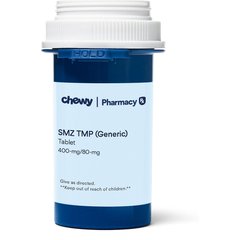SMZ-TMP for Dogs
iStock/fotografixx
PetMD’s medications content was written and reviewed by veterinary professionals to answer your most common questions about how medications function, their side effects, and what species they are prescribed for. This content shouldn’t take the place of advice by your vet.
What Is SMZ-TMP for Dogs?
SMZ-TMP (sulfamethoxazole/trimethoprim) is a prescription antibiotic used in dogs to treat susceptible bacterial infections. SMZ-TMP is a combination of two antibiotics, sulfamethoxazole and trimethoprim, which work together to fight bacterial infections. SMZ-TMP can also be used in cats, but is rarely prescribed.
Veterinarians may prescribe SMZ-TMP for dogs for certain infections of the respiratory tract, urinary tract (kidney, bladder, prostate), and skin, based on the results of culture and sensitivity testing. SMZ-TMP is not prescribed as often as other antibiotics, as it has a higher risk of side effects. Your vet will determine if SMZ-TMP is right for your pet.
SMZ-TMP is FDA-approved for human use as intravenous and oral formulations (tablet and suspension). It is commercially available under various brand names like Bactrim® and Sulfatrim® Pediatric, as well as generic sulfamethoxazole-trimethoprim. SMZ-TMP is currently not FDA-approved as a veterinary medication.
However, it is readily utilized in the veterinary field, and veterinarians can legally prescribe certain human drugs in animals in certain circumstances. This is called extra-label or off-label use because this use isn’t described on the drug label. Your veterinarian will determine whether this medication is right for your pet.
In certain circumstances, your vet may recommend a compounded formulation of SMZ-TMP. Compounded medications are prescribed if there’s a specific reason your pet’s health can’t be managed by an FDA-approved drug, such as if your pet has trouble taking pills in capsule form, the dosage strength is not commercially available, or the pet is allergic to an ingredient in the FDA-approved medication.
Compounded medications are not FDA-approved. They are created by either a veterinarian or a licensed pharmacist on an individual basis to best suit a patient’s particular needs. You can learn more about compounded medications here.
SMZ-TMP Considerations in Dogs
SMZ-TMP is generally not used in pets with certain medical conditions, such as liver disease, low blood cell counts (bone marrow suppression), and in pets who are hypersensitive to it. SMZ-TMP is used with caution in dehydrated pets and in pets with kidney disease, bladder stones, and urinary crystals.
Certain dog breeds—Doberman Pinschers, Samoyeds, and Miniature Schnauzers are more prone to the side effects of SMZ-TMP.
Safe use had not been established in breeding, pregnant, or lactating animals at the time of publication.
Giving SMZ-TMP with certain medications can result in health risks to your pet, so it is important to discuss your pet’s medications, including vitamins and supplements, and medical conditions with your veterinarian.
How SMZ-TMP Works in Dogs
The two active ingredients in SMZ-TMP are sulfamethoxazole and trimethoprim antibiotics. SMZ-TMP works by blocking a susceptible bacteria’s DNA from being able to replicate, thereby preventing the bacteria from multiplying and thriving.
SMZ-TMP Directions for Dogs
Follow the directions on the drug label or as provided by your veterinarian.
Your veterinarian may instruct you to give the medication once or twice daily, depending on the medical condition being treated and your pet’s individual needs.
Always provide your pet with plenty of water when they are taking SMZ-TMP.
Missed a Dose?
Speak with your veterinarian about what to do if you forget to give a dose of SMZ-TMP. Generally, they may instruct you to give it when you remember, or if it is almost time for your pet’s next dose, to skip the missed dose and resume your normal dosing schedule. Do not give extra or double doses.
Possible Side Effects of SMZ-TMP In Dogs
Common side effects may include gastrointestinal upset (decreased appetite, vomiting, diarrhea).
Possible serious side effects include:
-
Dry eye disease (keratoconjunctivitis sicca, or KCS), which can cause crusty or yellow-green eye discharge, squinting, eye redness, and eye pain
-
Liver inflammation, which can cause yellowing (jaundice) of the skin, eyes, and gums
-
Fever
-
Low blood cell counts (bone marrow suppression)
-
Autoimmune destruction of red blood cells (IMHA)
-
Autoimmune destruction of platelets (IMT)
-
Allergic reaction with hives and swelling of the face
-
Swollen joints (polyarthritis)
-
Abnormally low thyroid levels (hypothyroidism)
Contact your veterinarian immediately if your dog has any of these symptoms.
Human Side Effects
SMZ-TMP is also a prescription medication for humans, frequently with dosages different from those prescribed for your pet by a veterinarian. Due to possible side effects, humans should never use medicine dispensed for their pets and pets should not be given any medicine dispensed for a human’s use.
If you are allergic to sulfa antibiotics, are pregnant, trying to become pregnant, or breastfeeding, ensure that you do not ingest this medication, or talk to your veterinarian about the possibility of administering an alternative medication to your pet.
If you accidentally ingest a pet medication, call your physician or the national Poison Control Center hotline at 800-222-1222.
Call Your Vet If:
-
Severe side effects are seen (see above)
-
Your pet’s condition worsens or does not improve with treatment
-
You see or suspect an overdose
-
You have additional questions or concerns about the use of SMZ-TMP
SMZ-TMP Overdose Information for Dogs
Signs of an overdose of SMZ-TMP may include gastrointestinal upset (nausea, vomiting, diarrhea), low energy (depression), facial swelling, low blood counts (bone marrow depression), and increased liver levels.
If you suspect an overdose, immediately contact your veterinarian or an animal poison control center. Consultation fees often apply.
Pet Poison Helpline (855) 764-7661
ASPCA Animal Poison Control (888) 426-4435
SMZ-TMP Storage for Dogs
Always confirm storage requirements by reading the prescription label or supplemental medication information provided by the dispensing pharmacy.
SMZ-TMP should be stored at controlled temperatures between 68–77 F.
Keep the container tightly closed in order to protect its contents from moisture and light.
Compounded medications should be stored according to the compounding pharmacy’s label or supplemental medication information provided.
Keep out of reach of children and pets.
No vet writer or qualified reviewer has received any compensation from the manufacturer of the medication as part of creating this article. All content contained in this article is sourced from public sources or the manufacturer.
References
Anyogu DC, Shoyinka SVO, Ihedioha JI. Haematological changes in dogs with prolonged administration of high doses of sulphamethoxazole/trimethoprim. Comparative Clinical Pathology. 2018;27(4):1001-1005.
Plumb DC. Sulfadiazine/Trimethoprim, Sulfamethoxazole/Trimethoprim. Plumb’s Veterinary Drugs. Updated September 2022. Accessed June 4, 2024.
Trepanier LA. Idiosyncratic toxicity associated with potentiated sulfonamides in the dog. Journal of Veterinary Pharmacology and Therapeutics. 2004;27(3):129-138.
Trepanier LA, Danhof R, Toll J, Watrous D. Clinical findings in 40 dogs with hypersensitivity associated with administration of potentiated sulfonamides. Journal of Veterinary Internal Medicine. 2003;17(5):647-652.
Twedt DC, Diehl KJ, Lappin MR, Getzy DM. Association of hepatic necrosis with trimethoprim sulfonamide administration in 4 dogs. Journal of Veterinary Internal Medicine. 1997;11(1):20-23.


